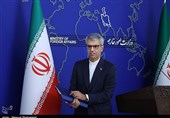Iran, Sweden Hold Political Talks in Tehran
TEHRAN (Tasnim) – Diplomats from Iran and Sweden held the third round of periodic political consultations between the two countries in Tehran, discussing bilateral, regional and international issues.
In the Sunday meeting, co-chaired by Iranian Deputy Foreign Minister for Political Affairs Seyed Abbas Araqchi and State Secretary to Sweden’s Minister for Foreign Affairs Annika Soder, the two sides mainly discussed the Joint Comprehensive Plan of Action (JCPOA) and concerns about a possible US withdrawal from the nuclear agreement.
Denouncing the US administration’s bullying policies and lack of commitment that have taken the nuclear deal to the brink of fall, Araqchi said the JCPOA is initially a security agreement in the area of nuclear non-proliferation whose failure would weaken the non-proliferation order and aggravate regional crises.
He also called for Europe’s practical and genuine action to prevent the failure of the JCPOA, warning that the policy of appeasing US President Donald Trump and making concessions to the violator of the JCPOA results from wrong policies.
In a separate meeting on Sunday, the visiting Swedish diplomat held talks with Iranian Foreign Minister Mohammad Javad Zarif on the nuclear deal, the situation in Yemen and the latest developments in Syria.
And another meeting between Ms. Soder and Hossein Jaberi Ansari, the Iranian foreign minister's special assistant on political affairs, was focused on Middle East conflicts and efforts to settle the crises in Yemen and Syria.
Iran and Sweden signed a memorandum of understanding (MoU) in June 2016 to convene periodic political consultations.
Sunday’s talks came a few days before the US president’s upcoming decision about Washington’s commitment to the JCPOA.
Iranian President Hassan Rouhani has warned that the US will face a “historic regret” should it decide to withdraw from the nuclear agreement.
Since the accord between Iran and the Group 5+1 (Russia, China, the US, Britain, France and Germany) was signed in Vienna in July 2015, the International Atomic Energy Agency (IAEA) has repeatedly confirmed Iran’s compliance with its commitments.






